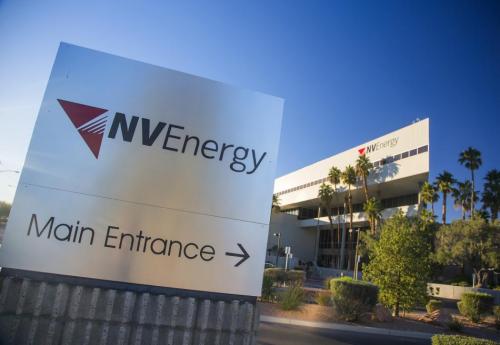View the full image
NV Energy corporate headquarters as seen on Nov. 22, 2017. (Jeff Scheid/The Nevada Independent)
Amy Alonzo, The Nevada Independent
Nevada utility regulators have unanimously denied a request by NV Energy to raise the basic service charge for its Northern Nevada customers by 175 percent, instead on Tuesday awarding the utility just a fraction of its requested amount.
NV Energy, the state’s largest electric utility, had sought to increase the basic service charge — the flat rate customers pay just to have electric service — by $28.80 per month for single-family residential users, while simultaneously lowering how much customers pay for actual energy use.
The request would have increased Northern Nevada’s basic service charge from $16.50 to $45.30 per month and made it the highest in the United States “by a considerable margin,” according to the state’s Bureau of Consumer Protection.
NV Energy, which serves nearly 328,000 customers throughout Northern Nevada, had argued that the pricing change would guarantee more stable monthly electric bills. The utility also said it would simultaneously halve the cost customers pay per kilowatt hour for electricity, a move the utility said would result in no net increase in average customer bills but opponents said would penalize those who conserve energy or utilize solar.
The proposed rate increase garnered substantial public protest — more than 250 people offered fiery comments during multiple consumer sessions hosted by utility regulators, and groups ranging from the Nevada Conservation League to Solar United Neighbors offered vocal opposition.
The Solar Energies Industry Association described the proposal as “extreme [and] unsupported,” claiming that NV Energy was attempting to work around legislative protections for net energy metering customers “under the guise of bill stability.”
Instead, the three-member Public Utilities Commission of Nevada approved a $2 per month increase, or 12 percent, for Northern Nevada single family residential users. The new monthly charge, set to go into effect in October, will put Northern Nevada customers on an equal footing with the basic service charge paid by their Southern Nevada counterparts.
“NV Energy teams are already in the process of analyzing the various components of the order and what it means to northern Nevada customer bills and rates,” a spokesperson for the utility said in an email.
Commissioner Randy Brown said the original request by NV Energy was “much too high.”
According to Advanced Energy United, a nationwide industry association focused on clean energy, the highest fixed charge in the nation for investor-owned utilities is $34.71, in Mississippi. The national average is $11.66 across 170 other investor-owned utilities.
“Today’s decision not only prevents a disastrous rate hike for households, but also shows that the PUCN listened to consumers’ concerns,” Advanced Energy United’s Nevada lead Emilie Olson said in an email. “Opting for a modest increase instead, the PUCN’s vote demonstrates a commitment to prioritizing affordability for all consumers, safeguarding Northern Nevadan ratepayers from unfair monthly rate hikes, and setting a positive precedent that will help prevent similarly onerous basic service charge increases for consumers in Southern Nevada as well.”
In its draft order, the commission stated that the proposed increase was “inordinately large and not in the public interest,” noting that it would disproportionately affect low-usage customers and would discourage energy conservation. The order countered NV Energy’s arguments about price stability by noting that most of the volatility in customer bills came from fuel costs.
NV Energy generates its electricity from a portfolio that includes coal, solar, geothermal and natural gas. The U.S. Energy Information Administration expects natural gas prices will stay lower in 2024 than in previous years because of higher-than-normal inventory. More than half of the electricity used in Nevada is generated at natural gas plants.
When natural gas prices rise again, opponents to the rate increase argued, so would customers’ bills. NV Energy countered that raising the basic service charge while lowering the amount paid for usage would keep prices more stable during times of volatile natural gas prices.
In its original request, NV Energy described the basic service charge increase as necessary to cover investment costs in Northern Nevada, including expanding service and addressing a financial shortfall caused by net metering — credits residential solar producers get for adding electricity to the grid. To do so, the utility said it needed to recover nearly $106 million annually from ratepayers, with most of that, $95 million, coming from residential electricity users.
State energy regulators also limited requested increases for charges to multifamily residential users and natural gas customers.
NV Energy requested the basic service charge paid by multifamily residential users be raised from $8 to $18.80 per month; the commission instead is allowing an increase to $9.25. The utility will also be allowed to increase the basic service charge for its small commercial users and natural gas customers, from $14 to $16, less than the $18 requested by NV Energy.
The commission also lowered NV Energy’s overall request by setting the return on equity for shareholders at 9.65 percent, a small increase from the current rate of 9.5 percent but far below the utility’s proposed jump to 10.4 percent.
— This story is used with permission of The Nevada Independent. Go here for updates to this and other Nevada Independent stories.
Source link : http://www.bing.com/news/apiclick.aspx?ref=FexRss&aid=&tid=66f1baab9d5a4cec895ceee606d1c32e&url=https%3A%2F%2Fcarsonnow.org%2Fstory%2F09%2F22%2F2024%2Futility-regulators-shoot-down-nv-energy-s-proposed-rate-change-northern-nevada&c=3897751762677829703&mkt=en-us
Author :
Publish date : 2024-09-22 10:58:00
Copyright for syndicated content belongs to the linked Source.